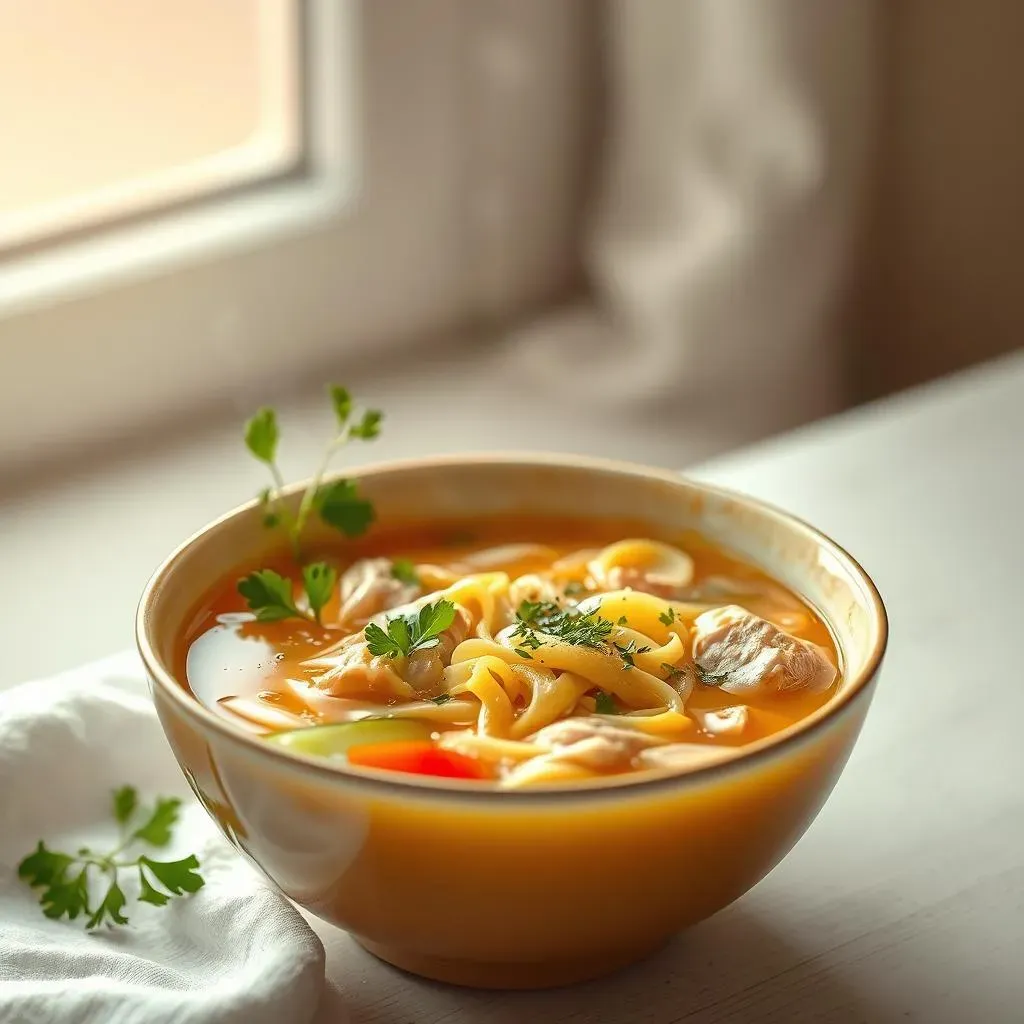Table of Contents
For generations, chicken noodle soup has been a go-to remedy for a rumbling tummy and the sniffles. But is there more to this comforting classic than just warm fuzzies? This article explores the surprising connection between chicken noodle soup and healthy digestion. We'll examine the science behind why this seemingly simple dish can actually benefit your gut health. You'll learn about the key ingredients that contribute to its digestive powers, from the easily digestible protein in chicken to the soothing properties of broth. We'll also guide you through creating your own perfect bowl of chicken noodle soup for healthy digestion, focusing on ingredient choices that maximize gut-friendly benefits. Get ready to discover how this age-old remedy can be a powerful tool in your quest for optimal digestive wellbeing. Prepare to learn the secrets behind chicken noodle soup for healthy digestion and how to harness its power for a happier, healthier you!
Chicken Noodle Soup: A Digestive Comfort Food?

Chicken Noodle Soup: A Digestive Comfort Food?
Grandma's Wisdom and Modern Science
Let's be honest, chicken noodle soup has always held a special place in our hearts (and stomachs!). It's the ultimate comfort food, the go-to remedy for a bad cold, or just a generally crummy day. But beyond its feel-good factor, there's a growing body of evidence suggesting that this humble soup might actually have some real digestive benefits. Many people swear by its ability to soothe upset stomachs and ease digestive discomfort, and anecdotally, it seems to work wonders.
Think about it – the warm broth is easy on the system, the soft noodles are gentle on the gut, and the chicken provides easily digestible protein. It's a perfect blend of nourishment and comfort, exactly what you need when your digestion is acting up. But is it just a placebo effect, or is there real science behind this age-old remedy? That's what we're going to explore.
Ingredient | Potential Digestive Benefit |
|---|---|
Chicken Broth | Hydration, electrolytes |
Chicken | Easily digestible protein |
Vegetables (carrots, celery) | Fiber, vitamins, and minerals |
Noodles | Easy to digest carbohydrates |
Beyond the Warm Fuzzies: Early Evidence
While more research is needed to definitively prove all the claims surrounding chicken noodle soup and digestion, early studies hint at some interesting possibilities. For example, some research suggests that the broth's components may help reduce inflammation in the gut, which could be beneficial for those experiencing digestive issues. The easily digestible nature of the ingredients also means less stress on the digestive system when it's already feeling under the weather.
Of course, it's not a magic bullet. The benefits largely depend on how the soup is made. A broth loaded with sodium and unhealthy fats won't do much good. We'll explore how to make a truly gut-friendly version in the next section. But the initial evidence suggests that chicken noodle soup might be more than just a comforting tradition; it could be a surprisingly effective ally for your gut.
The Science Behind Chicken Noodle Soup for Healthy Digestion

The Science Behind Chicken Noodle Soup for Healthy Digestion
Broth: The Foundation of Gut-Friendly Goodness
Let's start with the broth, the heart and soul of chicken noodle soup. It's not just water; it's a powerhouse of potential digestive benefits. First, the warmth itself can be soothing to an upset stomach. Think of it as a gentle hug for your gut. The broth also provides hydration, which is crucial when you're experiencing digestive upset, as dehydration can worsen symptoms. Furthermore, homemade chicken broth, especially bone broth, is rich in electrolytes, which are lost through vomiting or diarrhea. These electrolytes help to regulate fluid balance in the body, aiding in recovery.
Beyond hydration and electrolytes, some research suggests that certain components of broth, such as collagen (abundant in bone broth), may have anti-inflammatory properties. Inflammation plays a significant role in many digestive disorders, so reducing it could be beneficial for improving gut comfort and function. Remember, we're talking about *homemade* broth here; store-bought versions often contain high levels of sodium, which can actually worsen digestive problems.
- Hydration
- Electrolytes (sodium, potassium)
- Potential anti-inflammatory compounds (collagen)
Chicken and Noodles: Easily Digestible Powerhouses
Now, let's talk about the chicken and noodles. Chicken is a fantastic source of easily digestible protein, essential for repairing and maintaining gut lining cells. When your gut is inflamed or irritated, you need easily digestible protein to aid in the healing process. The chicken in your soup provides just that, making it easier for your body to process and use for repair. The noodles, if you choose a simple egg noodle, provide easily digestible carbohydrates, a source of quick energy when your body needs it most. This combination of protein and carbohydrates is an excellent way to support your body's natural healing process.
It's important to note that the type of noodles makes a difference. Avoid noodles with added sugars or complex ingredients that could complicate digestion. Similarly, lean chicken is preferred over fatty cuts. The key is to choose ingredients that are easy on the digestive system when it's already struggling. This is crucial for maximizing the potential digestive benefits of the soup. This is where careful ingredient selection comes into play – something we'll delve into more deeply in the next section.
Ingredient | Digestive Benefit |
|---|---|
Chicken (lean) | Easily digestible protein for gut repair |
Simple Egg Noodles | Easily digestible carbohydrates for energy |
The Role of Vegetables and Spices: Enhancing the Gut-Friendly Effects
Finally, let's not forget the vegetables and spices. While often overlooked, these ingredients play a crucial role in enhancing the gut-friendly effects of chicken noodle soup. Carrots, celery, and onions are all good sources of fiber, but in small amounts; too much fiber can be irritating when digestion is already compromised. These vegetables also contribute vitamins and minerals that support overall health and immune function, which is important for efficient digestion. Adding herbs and spices like ginger or turmeric can further boost the anti-inflammatory benefits, potentially easing digestive discomfort.
However, it's important to use these additions in moderation. Too many spices or strong flavors can irritate a sensitive stomach. The goal is to create a nourishing and soothing soup, not an overly intense culinary experience. The balance is key. Think of it as a delicate dance between providing beneficial nutrients and avoiding anything that could potentially upset your already sensitive gut. The next section will provide a comprehensive guide to crafting the perfect gut-friendly bowl of chicken noodle soup.
Crafting the Perfect Chicken Noodle Soup for Optimal Gut Health

Crafting the Perfect Chicken Noodle Soup for Optimal Gut Health
Choosing Your Ingredients: Quality Over Quantity
Let's get down to the nitty-gritty: ingredient selection. Forget those pre-packaged, sodium-laden soups! For a truly gut-friendly experience, you need to start with high-quality, whole ingredients. Choose a free-range, organic chicken if possible, for leaner protein and a richer flavor. Bone-in chicken is best for making a flavorful broth, packed with collagen and nutrients. When selecting your vegetables, opt for organic options whenever possible to minimize exposure to pesticides. Go for fresh, seasonal vegetables for the best flavor and nutritional value. For noodles, simple egg noodles are best; avoid anything with added sugars or preservatives. Remember, the goal is simplicity and quality to maximize the digestive benefits.
Don't be afraid to experiment with different vegetables. Carrots, celery, and onions are classics, but you can add others like leeks, parsnips, or even zucchini for added flavor and nutrients. Just remember to keep the quantities moderate, especially if you have a sensitive stomach. Too much fiber can actually cause digestive upset, so start small and adjust according to your tolerance. Let's focus on quality ingredients to create a nourishing and delicious soup that is easy on your digestion.
Ingredient | Recommendation |
|---|---|
Chicken | Organic, free-range, bone-in |
Broth | Homemade chicken or bone broth (low sodium) |
Vegetables | Fresh, organic, moderate quantities |
Noodles | Simple egg noodles (no added sugars) |
Crafting the Broth: The Key to Digestive Harmony
The broth is the foundation of your soup, so let's make it count. Start by roasting your chicken bones (if using bone broth) to enhance the flavor and extract more collagen. Then, simmer the chicken and vegetables in plenty of water for at least a few hours, allowing the flavors to meld and the collagen to break down. This slow simmering process is crucial for creating a rich, flavorful broth that's also gentle on the digestive system. Strain the broth to remove any solids before adding the cooked chicken and noodles. Seasoning is important, but keep it simple—salt, pepper, and a touch of herbs are all you really need. Avoid excessive sodium, which can be harsh on the gut. The goal is to create a comforting, flavorful broth that supports, not hinders, digestion.
Remember, homemade broth is key here. Store-bought broths often contain high levels of sodium and other additives that can irritate the digestive system. Taking the time to make your own broth is a worthwhile investment in your gut health. This allows you to control the sodium content and ensure that your soup is free from potentially irritating additives. The extra effort will be well rewarded with a delicious and gut-friendly soup.
- Roast bones for deeper flavor (bone broth)
- Simmer for at least 2-3 hours
- Strain broth before adding other ingredients
- Season simply with salt, pepper, and herbs
Perfecting Your Portion and Timing: Listening to Your Body
Finally, let's talk about portion size and timing. Even the most gut-friendly soup can cause problems if you eat too much, too quickly. Start with a small bowl and see how you feel. If all is well, you can always have more later. Pay attention to your body's signals. If you feel any discomfort, slow down and stop eating. It's better to err on the side of caution, especially when your digestion is sensitive. Remember, this is about nourishing your body, not overwhelming it. Listen to your body's cues and adjust your intake accordingly.
Timing is also important. Avoid eating large quantities of soup right before bed, as this can lead to indigestion. It's best to enjoy your soup earlier in the day or several hours before bedtime. This allows your body ample time to digest the food before you go to sleep. This mindful approach to eating is crucial for maximizing the benefits of your gut-friendly chicken noodle soup. By paying attention to your body and adjusting your intake accordingly, you can ensure that your soup serves as a source of comfort and nourishment, not a cause of digestive distress.
